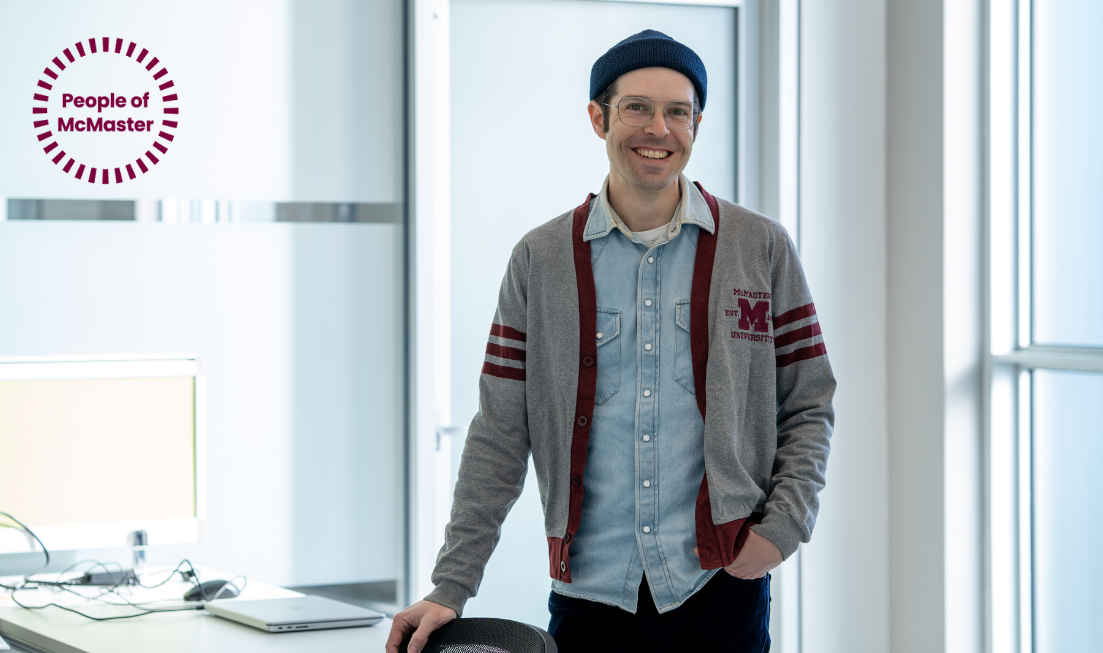Maxime Dagenais: Coming Home to McMaster

Max Dagenais, an adjunct assistant professor in the department of History, and research program manager at the Centre for Advanced Research in Experimental and Applied Linguistics, is a passionate ambassador for the humanities.
People of McMaster celebrates the incredible people who help make McMaster a great place to work, learn, teach and conduct research. This is the fourth instalment of this series. Click here for the previous one.
For Maxime (Max) Dagenais, McMaster has always felt like home.
This is where he completed a postdoc, launched his academic career, and built lifelong friendships.
After several years working in various roles at the university, Dagenais took a position at another institution — but it wasn’t long before he found his way back.
“When I returned to Mac, it felt like I was exhaling,” he says. “It was familiar, it was supportive, and it felt like the right place to be — especially during a really chaotic time in my life.”
Dagenais’s son Tristan was diagnosed with cancer in 2021. As Tristan underwent surgery and treatment at McMaster Children’s Hospital, Dagenais saw first-hand the strength of the campus community — not just in health care, but in humanity.
Now an adjunct assistant professor in the department of History and the Research Program Manager at ARiEAL (Centre for Advanced Research in Experimental and Applied Linguistics), Dagenais supports innovative research and experiential learning that blends the humanities with STEM-based methods.
What’s something people might not realize about the work ARiEAL does?
A lot of people assume that ARiEAL is a traditional humanities research centre, but we’re actually an interdisciplinary centre that brings researchers from the humanities, sciences, engineering, and health sciences to explore language’s role in society, technology, and the human experience.
We have EEG machines that track brainwaves during language tasks and eye-tracking equipment to study how people read.
High school students who visit are always surprised when we hand them a brainwave cap or start talking about artificial intelligence and equity in tech. It’s not what they expect from “the humanities.”
Our research has pretty far-reaching benefits in health and rehabilitation, Indigenous language revitalization, and the development of responsible AI. From improving therapies for communication disorders to preserving endangered languages, our researchers are working on projects that make a substantial difference in society.
You’ve worn both academic and staff hats. How do you balance them?
Honestly, the best part of both sides is working and connecting with students. Whether I’m helping with grant applications, organizing workshops, teaching in the history department, or just chatting about research, music, Gen Z English (which I am learning), and other everyday things, their energy keeps me going. It’s a huge boost.
I missed that when I was away from the humanities, so I’m thrilled to be back in a space that connects me with both undergrads and grads every day.
Your family went through a challenging time with your son’s health. How has that shaped your connection to McMaster?
In 2021, my son Tristan was diagnosed with a brain tumour. It was terrifying. But the care we received here was phenomenal — Dr. Olufemi Ajani, Dr. Sheila Singh, Dr. Adam Fleming and so many others went above and beyond.
I’ll never forget Dr. Ajani giving me a thumbs up after Tristan’s surgery — it was the best thumbs up I’ve ever received. Being part of this community, knowing the same people who work across campus helped save my son’s life, gives a whole new meaning to “McMaster family.”
What does success mean to you?
Are you happy? If the answer is yes, then you’ve succeeded. I used to stress about small things — typos, awkward emails, imposter syndrome — but I’ve learned most people are too busy with their own worries to notice. Let it go and focus on the things that actually matter.
Outside of work, what are you into?
Excessive shopping — especially for sweaters, denim, flannel, jackets, boots, bags… you name it. I’m still lobbying McMaster to bring back vintage-inspired cardigans with just the old-school “M.”
I even wore my classic Mac cardigan for the photo shoot. It’s the one I bought in 2014 when I thought I was leaving for good. Come on Mac! Bring back a vintage wool cardigan. Burgundy with a big ‘ol grey M. I have designs ready if you need inspiration!


